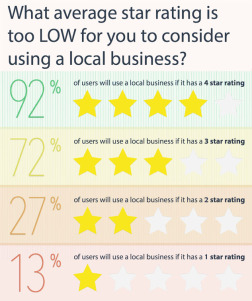MORE MOBILE = MORE LOCAL
November 5, 2015 | By Jill McFarland+ | No Comments
I was recently in NYC with a coworker. We were trying to get to Applebee’s on 50th and Broadway, which I had been to many times. I could tell that the Uber driver wasn’t going the right way and told my coworker that something was wrong. We arrived at the address the Uber driver was given and there was no Applebee’s, lots of other restaurants but no Applebee’s.
I asked my coworker what address he gave the driver and he showed me his phone. The address he’d shown the driver was from the first search result; a Yelp listing that was incorrect. In our case we knew the Applebee’s existed and rerouted the driver. Had we not recently been to that Applebee’s, we probably would’ve thought it was gone and have gone to one of the many other restaurants in the area.
More than 50% of Google searches are done on mobile devices. This makes local online properties increasingly important. Even when searching on a desktop or tablet, we’re more and more frequently given the option to search “near me.” With mobile search, the first three organic search results get more than 64% of clicks. For brick and mortar locations, those results tend to be Google business pages, Yelp or Facebook pages.
Consumers aren’t thinking about the fact that information like address, phone number and hours of operation are crowd sourced on Yelp and Google pages. Consumers still “check-in” and if they can’t find a location’s page, they’ll create one often resulting in duplicate pages with misinformation. Brands can claim or verify their pages and try to maintain them. This is a challenge for multi unit brands like Applebee’s with nearly 2000 locations.
In 2014 Google commissioned two custom research studies to look at local search behavior across devices. Here are some of their findings:
- 4 out of 5 consumers use search engines to find local information.
- 56% of smartphone searches while on the go have local intent.
- 50% of consumers who conducted a local search on their smartphone visited a store within a day.
Google and Facebook have both made recent announcements that emphasize the importance of local business pages. This trend will continue as consumers expect more locally relevant search results.
Here are three things you can do to increase your chances of showing up in local search results with correct information:
- Use a platform like MomentFeed, Social Strategy1, Brandify, Venue Labs or Location3 to manage your location information. These tools can help you consolidate duplicate pages, and ensure your information such as address, phone number, and hours of operation are correct. Some give you the ability to publish or run ads locally. Some of them let you manage reviews from the platform.
- A survey conducted by BrightLocal found that 72% of those surveyed are likely to use a business with a 3 star rating while only 27% would use a business with a 2 start rating.
 That’s a huge difference!
That’s a huge difference!
You’ll notice in local search results that the first three locations rarely have less than four stars. Locations with better ratings rank higher. Ratings and reviews not only encourage or deter guests but they also impact search ranking.
Encourage guests to leave reviews and pay attention to them. By encouraging guests to leave reviews they’re more likely to tell you if they had a bad experience while still at your location. This gives you the opportunity to correct the situation before they complain on a review site.
- Educate franchisees and local managers that online properties have an impact on the success of their physical locations. You can manage pages at the brand level through one of the platforms I’ve mentioned or you can empower franchisees or local managers to manage them. Either way, they need to be aware of what bad reviews and misinformation are doing to their reputation and ability to be found in search results.
What I’ve been describing is pull marketing. It’s unobtrusive and doesn’t turn consumers off like some advertising can. If a consumer is looking for what it is you offer and you’re not in their search results someone else will get their business.
Things change quickly on the Internet. One trend that is not likely to go away any time soon is the importance of mobile and localization.
*** Original article can be viewed on Jill McFarland’s blog, Stellar Digital Marketing.
Other references:
- Google Announcement: http://searchengineland.com/new-google-local-search-display-230525
- Google Announcement (cont.): http://searchengineland.com/study-googles-new-local-pack-shows-in-the-number-one-spot-93-of-the-time-229025
- Facebook Announcement: https://www.facebook.com/business/news/pages-updates


Submit a Comment